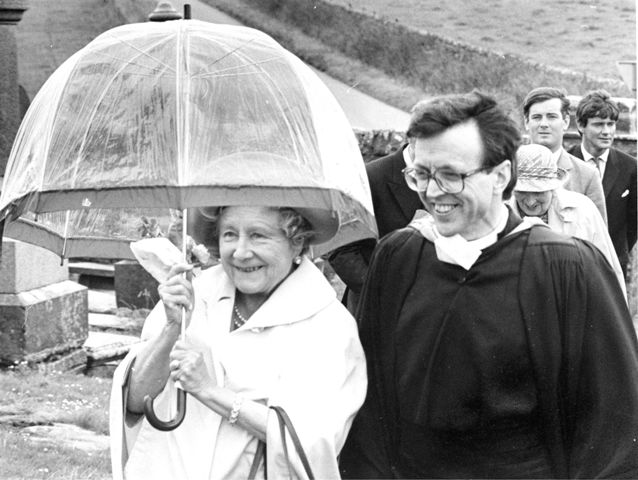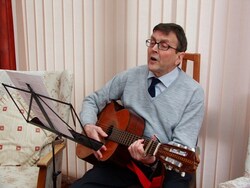 Related Articles
Related Articles
|
|
|
|
|
Revivals in the Highlands: Part 1
Rev. Alex Muir has researched how God has worked in the past and speaks of revivals: 'We can't demand it, and we can't work it up - but we can share a longing for God's times of refreshing.'
 IN the ongoing history of the Church circumstances and methodologies may change. But there are three things which will never change: IN the ongoing history of the Church circumstances and methodologies may change. But there are three things which will never change:
(i) the fundamental truths of the Gospel whose focus is always the Lord Jesus Christ;
(ii) the sovereignty of God in the Gospel whose Spirit we cannot direct or manipulate;
(iii) and the power of God through the Gospel, a power which we must never underestimate.
In genuine revival these factors are always present.
But what is revival?
But what is revival? Revival is a special outpouring of the Holy Spirit upon the Church which brings to it new life and power and growth after a period of spiritual dearth and decline. Dr. Martin Lloyd Jones describes it in the words of Peter in Acts 3: 19: ‘times of refreshing… from the presence of the Lord’, a phrase which sums up both the Divine source and the spiritual effects of revival. We can’t order it. It’s given in God’s time. We can’t demand it. It’s in God’s gift. And we can’t work it up.
As on the day of Pentecost, it comes ‘suddenly from heaven’. We depend upon God’s grace for our personal salvation. We depend upon that same grace for our personal and corporate witness in the world. Jesus told His disciples in Acts 1:8: You will receive power when the Holy Spirit comes upon you and will be my witnesses.’
Revival isn’t given to provide us with exciting religious experiences. God pours out the gift of His Spirit to make us effective witnesses of Jesus Christ and to bring glory to His name
A tombstone in Larbert
In the kirkyard of Larbert, near Falkirk, there's a tombstone bearing the intitials RB and the inscription: Cristus in vita et in morte lucrum or In both life and death, Christ is an advantage to me, echoing the words of Paul: For me to live is Christ and to die is gain.
Beneath this stone are the mortal remains of one of the great leaders of the Scottish Reformation, Robert Bruce. Better known to most people is King Robert the Bruce who fought for the political independence of Scotland in the 14th. century.
More than two centuries later, this Robert Bruce fought for a more important independence, a spiritual one, the freedom of the Kirk from control by the State. Having said that, it’s of interest to point out that Robert Bruce’s father, Alexander, the Laird of Airth in Stilingshire, could show a direct descent from King Robert. There was royal blood on his mother's side as well. Janet Livingstone was a great-granddaughter of James I.
But this man of God sought no earthly rank. His only aim was to love and serve the King of Kings and to strive to secure the crown rights of Jesus in the Church for which He died and of which He is the only true Head.
Minister to the King
As a preacher of the Gospel, however, Bruce did rise to prominence. In 1588, he was called to St. Giles in Edinburgh. Among other responsibilities in the Scottish capital, he had to preach to King James VI who had little liking for the Presbyterian system of Church government.
He much preferred Episcopacy which gave him power over the Church as its earthly governor, Its hierarchical structure of bishops, was also better suited to his ideas of class and dignity. He once famously declared, Nae Bishop, nae King.
Presbyterianism, or rule by elders, was not only more scriptural but more democratic. The minister was only a teaching Elder, first among equals, and the congregation was free to call him to a charge without any interference from the King or the landed gentry.
In 1596, Andrew Melville, had told the King: There are twa kings and twa kingdoms in Scotland. There is Christ Jesus the King and His kingdom the Kirk, wha’s subject James VI is and of wha’s kingdom, not a king nor a Lord nor a heid but a member. In a church service, James was only another hearer of the Gospel, and Robert Bruce saw him in the same need of salvation as any commoner. Bruce knew that all was not well spiritually with his majesty but he refused to adapt his message to keep the king's favour.
On one occasion, while preaching from Isaiah 38 about King Hezekiah's illness and recovery, he boldly addressed James with these words: The Lord make you, Sir, so to walk in your life that you may have a joyful testimony of your conscience in your death.
Preaching to tears
Bruce was a powerful preacher. The historian Kirkton gave this description of him in the pulpit: He made an earthquake upon his hearers and rarely preached but to a weeping audience.
| That is a sign of the work of the Holy Spirit and it’s found in every revival as people’s hearts are broken before the Lord who promises to revive the hearts of the contrite ones. Speaking of the restoration of God’s people from Babylon, Jeremiah writes: |
He made an earthquake upon his hearers and rarely preached but to a weeping audience. |
A great throng will return. They will come with weeping; they will pray as I bring them back (31:8-9). It was said of the ministry of Robert Murray McCheyne, that he would climb to the pulpit with tears running down his cheeks and to the sobs of the people in the pews.
This also brings to mind the words of the prophet Joel: Gather the people... Let the priests who minister before the Lord, weep between the temple porch and the altar. Let them say, ‘Spare your people, O Lord... Why should they say among the people,, ‘ Where is their God?’ (Joel 2: 17)
We may weep over the loss of power in the Church. We may weep over lost souls. But do we ever weep over the lost glory of God in the land out of love for Him and concern for His holy honour? This was one of Bruce's great burdens. In one of his sermons he spoke of how Scotland had once been a favoured and happy land. Now it was a miserable country, king and commonweal being alike in danger.
Behind Bruce's power in the pulpit was power with God in prayer and a relationship with the Almighty that made him feel God’s very heart. This he shared with his people saying, Lift up your hearts and crave eyes from God... that ye may get a sight of heaven and a foretaste of it in your souls.
Part 2: Part 3: Part 4
Note: Just after the final part of this series was published Rev. Alex Muir received his call to glory in March 2003.
 Rev. Alex Muir is a retired Church of Scotland minister who has had pastoral ministries in Caithness and the Western Isles. He is also a composer of hymns and spiritual songs which have been recorded along with the Addie Harper band in Wick. Rev. Alex Muir is a retired Church of Scotland minister who has had pastoral ministries in Caithness and the Western Isles. He is also a composer of hymns and spiritual songs which have been recorded along with the Addie Harper band in Wick.
The late Queen mother had her Castle of Mey holiday home in the parish of Canisbay and Keiss.
Ed footnotes:
Christians Together has made recordings of Alex singing psalms and some of his own compositions. You can listen to one of these tracks by clicking on the link below.
It is hoped to publish more of Alex's writings on revival history and a recording of him speaking on the subject.
* The above article is carried in the current edition of Sword magazine as an introduction to further writings on the subject.
|
Alex Muir/Sword Magazine, 16/09/2009
|

|
Sing the Glories of the Lamb
|
Alex Muir
|
| Rev. Alex Muir is a retired Church of Scotland minister and revival historian. |
| Downloads: |
3478 |
| Recorded: |
27/04/2009 |
| Length: |
2 minutes |
|
|
|
|
|
|
|